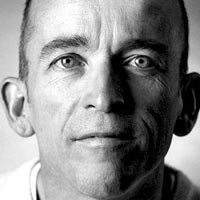Reading Mark Doty's poetry and nonfiction is like studying a storm through a raindrop. The titles of poems in his new book, Fire to Fire: New and Selected Poems (HarperCollins 2008), promise Big Ideas in closely observed moments, as reflected in a title such as "Theory of Beauty (Grackles on Montrose)."
Doty voices perhaps his Biggest Idea in 2007's Dog Years, a memoir: "I have never been able to accept the fact of limit." Dog Years grounds personal grief, recovery and the 9/11 attacks in Doty's beloved retrievers, Arden and Beau, in their lives and -- perhaps the ultimate limit -- their deaths.
"The brevity of a dog's life is one of the things that makes that life feel so alive, so precious," he says, by phone from New York, his summer home away from teaching at the University of Houston.
Doty, 54, became a powerful gay literary voice in 1993 with his poetry volume My Alexandria, for which he became the only American to win Great Britain's T.S. Eliot Prize. The book explores the AIDS epidemic, anchored in his partner's struggle with the disease.
A limit particularly he shies from, however, is the label "political poet." "Because when you say 'political poetry,' it sounds sort of dutiful, like, 'Oh, that's going to be work to read that,'" he says. "What I really want to do is make a poem that is as involved as it can be in how it feels to live. And certainly for an adult gay man to talk about how it feels to live and the dimensions of my life is inevitably to talk about politics, to talk about how we construct and think about sexuality in our culture now."
Fire to Fire, Doty's 12th book, is like a photo album, bulging with poems from previous volumes. "These poems invite the reader to go with me through a lot of aspects of a life," he says.
The book's collection of new poems, titled "Theories and Apparitions," reflect on his more than three decades of frustrations with and celebrations of language itself.
"I think part of it is a process of taking stock," he says. "And part of it is really an extension of something that's always been there, an interest in language as a fabric, as a medium."
Doty crafts that medium into poems that are intellectual, personal and dazzlingly descriptive. In "Pipistrelle" he describes the voice of a bat as "a diminutive chime / somewhere between merriment and weeping" and later asks "Is it because I am an American I think the bat came / especially to address me?"
That curiosity about the world within fires all of Doty's work. "I'm interested in meeting individuals, encountering the character of a writer," he says. "It's personality, it's how we think, it's how we feel about ourselves and about the world. All kinds of aspects of self can be brought to bear on a poem."
You can meet Doty's poems, and Doty himself, when he reads from Fire to Fire, Dog Years and one of his own favorite poets, C.P. Cavafy, at the June 20 installment of the American Shorts Reading Series. The program, titled "Passages of Gay Pride," is part of the Delta Foundation's Pride Week. The event includes a screening of the Oscar-winning short documentary "Freeheld"; readings of fiction and poetry submitted to the Persad Center, by WYEP's Rosemary Welsh and local composer and voice artist Jeffrey Nytch; and live jazz standards performed by local favorite Patrick Arena.
Mark Doty reads 7:30 p.m. Fri., June 20. New Hazlett Theater, Allegheny Square East, North Side. $10. 412-622-8866 or www.pittsburghlectures.org















